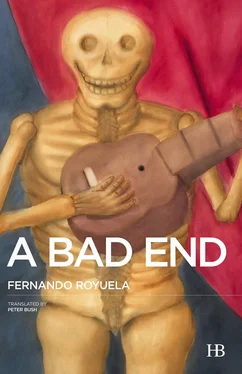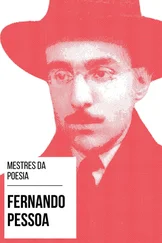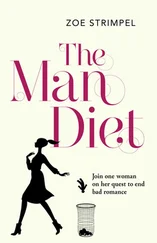Fernando Royuela - A Bad End
Здесь есть возможность читать онлайн «Fernando Royuela - A Bad End» весь текст электронной книги совершенно бесплатно (целиком полную версию без сокращений). В некоторых случаях можно слушать аудио, скачать через торрент в формате fb2 и присутствует краткое содержание. Год выпуска: 2016, Издательство: Hispabooks, Жанр: Современная проза, на английском языке. Описание произведения, (предисловие) а так же отзывы посетителей доступны на портале библиотеки ЛибКат.
- Название:A Bad End
- Автор:
- Издательство:Hispabooks
- Жанр:
- Год:2016
- ISBN:нет данных
- Рейтинг книги:3 / 5. Голосов: 1
-
Избранное:Добавить в избранное
- Отзывы:
-
Ваша оценка:
- 60
- 1
- 2
- 3
- 4
- 5
A Bad End: краткое содержание, описание и аннотация
Предлагаем к чтению аннотацию, описание, краткое содержание или предисловие (зависит от того, что написал сам автор книги «A Bad End»). Если вы не нашли необходимую информацию о книге — напишите в комментариях, мы постараемся отыскать её.
A Bad End — читать онлайн бесплатно полную книгу (весь текст) целиком
Ниже представлен текст книги, разбитый по страницам. Система сохранения места последней прочитанной страницы, позволяет с удобством читать онлайн бесплатно книгу «A Bad End», без необходимости каждый раз заново искать на чём Вы остановились. Поставьте закладку, и сможете в любой момент перейти на страницу, на которой закончили чтение.
Интервал:
Закладка:
When I’d finished snitching on handsome Bustamante, I felt good but deflated. I then remembered Gurruchaga and the time when they arrested him and took him away and I did nothing to help him. Justice is but the power to give everyone their just desserts; the dilemma is how to strike the right level. That morning I apportioned justice, at least as far as I was concerned. Handsome Bustamante turned pale when Mandarino extracted the pistol from Perico’s still-warm entrails. He tried to throw himself on me and would have gouged out an eye if the police hadn’t bludgeoned him until he was flat out next to the corpse of Frank Culá. He’d completely lost it, and that was his eternal downfall. “He killed him out of love,” was the comment you heard in the Stéfano circus when he was carried off foaming with rage. Inspector Esteruelas also gave me a good once over. “You were the dwarf accompanying that commie we caught in Córdoba, aren’t you, Snow White?” I denied that categorically. “We’ll settle accounts one day, you and I,” he threatened before leaving. I was right to lie, that divine right to go for the means required to achieve an end, and I was pleased as Punch, as I’d never been before. Emotion flooded my mind, and I enjoyed that moment as if I’d been reciting a poem by Federico to a packed hall— How horrific with the last / staves of shadow / Oh white wall of Spain ! / Oh black bull of sorrow ! Federico, just like Perico the lion, was killed by a single shot for a spurious reason that had nothing to do with him. Before he was murdered, he toured the villages of Spain, performing for the peasants the lines by Calderón. Violent hippogriff, running with the wind, ray without light, bird without hue, fish without scales, brute without natural instinct, in the confused labyrinth of these bare crags, where did you drag yourself and plunge down ? On that journey, he learned that the world was but a stage where everyone struggles to escape their role. Providence decided to grant him the role of victim. He was certainly dealt a bad end. I learned a little of the same at the Stéfano Circus, except rather than a stage, I perched on a cabinet of grotesqueries and stayed there, though now I enjoy better luck, controlling the fast-food market and banking disgusting amounts of money that have made a pillar of society of me. In any case, I had first to celebrate to the max my dwarfish condition by gobbling down hard-boiled eggs in the ring, surrounded by spectators, sick to the teeth of all that chicken nonsense, and with no way out, forced to carry on that way until I found a less outlandish way of life more in keeping with my age, which, year after year, was making my bones that much more brittle. Now that Frank Culá was dead on the altar of love — his heart sucked dry by flies — I was enthroned as king of the ring, and huge, uncoordinated Juan Culí had no option but to play a bit part in my routine. I completely revamped our act, which was now bereft of ghastly innuendo and piggish display, though it gained in comic vim thanks to my size and the astonishing contrast it created when exhibited next to Juan Culí’s. Now it was my act alone, and that’s how it was being advertised in the different places where we stopped and performed: Gregorio the Great, Goyo the Dwarf , and Goyito the Bone-Cruncher were a few of the names that cropped up on the posters; I was more up to my back teeth by the day, and the circus grew shabbier by the minute, left to its own fate, irrevocably damned by the ill-starred times and pudgy Di Battista’s alcoholic downturn. “Pudgy’s pissing blood,” Mandarino told me one day in a nervous state as a result. That guy showed an irrepressible admiration for everything excreted, to the point that he hoarded certain dry turds that he rated highly; Providence alone knows why they were especially attractive to him. It was true. Stéfano Di Battista had been sick for some time, more as a result of life than his drinking, and still he felt he was secure in a stagnant, unchanging world packed with glory and great feats, elevated honors and official awards, when increasingly what ruled was the collapse of a dream, and a mass grave toward which we were all hurtling hell for leather.
Without a partner, Doris continued to whirl through the air by herself; increasingly overwhelmed by her solitude on the trapeze, she decided to call it a day and return to the village of her childhood for a spot of peace and quiet. Her departure was like a premonition of my own immediate future. The circus was grinding to a halt at the speed of light; the big top couldn’t take more patches, and even its red fringes had turned the fungal green of putrefying meat. The few remaining animals were rheumatic and reluctant to perform their tricks and looked like beings marooned after a flood. Only the monkeys showed signs of life; when they were bored stiff, they masturbated without a flicker of lust, quite unlike Mandarino, who did it for consolation and pleasure. The artists kept leaving; some gave an excuse, some had a vital commitment, others took French leave. The Stéfano circus was the butt end of a guffaw, a broken shadow of itself, the stock perennial peering like a cypress over the damp slope of a cemetery. Doris left for Extremadura to thicken her thighs and hips on fruits of the pig and other innocent excesses. She soon married — badly. Poor girl, she found bad luck where she sought peace and quiet. The peremptory pressure of age, not love, pushed her into a relationship with a yokel whose stall sold pork, and cheese wheels from Casar de Cáceres; his stomach was a barrel and his tongue a black pudding, down to the excessive quantities of food he daily fed his body. She married him and misfortune. Riding on the one-way cart of passing years, Doris rushed to the altar dressed in pristine white with the obsolete virginity brought by disuse. He wasn’t malicious in himself, just a dimwitted rustic, and that led him to rub shoulders with coarse fellows of his kind. Doris didn’t love him, but that didn’t make her suffer; she’d seen too many passions flow under her bridge. In the middle of the wedding reception, after slicing the chocolate cake and swallowing the dregs of his El Gaitero cider, he widowed her in the most ridiculous way imaginable. The crude yokels celebrating that bumpkin’s wedlock, following a tradition rooted in barbarism, decided to auction off bits of the bride’s white knickers and the bridegroom’s starched tie, to which end they unfortunately employed a chainsaw rather than kitchen scissors, and a slip of the wrist sliced off his neck; he was beheaded like John the Baptist, only unshaven and flabbier around the gills. Dressing saints, weeping over the dead man’s wretched fate, getting fat on the chorizos she inherited, and remembering, now in a widow’s weeds, the excitement of the trapeze became the lot of withered Dorotea. The walking dead. She wasn’t aware that history is a river sluicing us toward progress; that’s why when it was finally time to go to the urns and see whether a new democratic creed could be fleshed out in a political constitution so many throats were chorusing, she went and voted no. Then she returned to her mother-in-law’s house and continued the task she had undertaken: the creation of a new mantle for the Virgin, a riot of embroidery, lacework, and filigree, worthy in the final instance of being preserved in an out-of-the-way diocesan museum.
Time changes fashions, customs, people’s politeness, peculiarities, partialities, and routine rituals. Folks were more into Pedro Carrasco’s boxing and the adventurous escapes of El Lute the bandit from the prisons of Spain, than the arthritic animals in the Stéfano circus. El Lute the bandit studied in jail to become a lawyer, and a song with English lyrics was penned about him: The man they call El Lute , it went. Fashions change, just like the jail terms handed out, I can tell you, and the Stéfano circus was caught in the time warp of a pre-television, deflated world in which the show’s exotica depended more on the backwater bumpkins attending it than the wonders it trumpeted over the megaphone — a démodé exotica of dingy feathers and sequins on flaccid bodies, of seventy-year-old animals with stomachs ruined by the ingestion of so much rubbish on the road; an eccentric array of individuals deformed on the inside or the outside who simply subsisted on the inertia of the trail they tramped; an exotica of belches and empty laughter that didn’t even bite in the land of yokels. Folks were focused elsewhere, on the Olympic gold hanging from the neck of Paquito Fernández Ochoa, on Luis Ocaña’s pioneering pedaling as he climbed onto the Tour’s podium — and didn’t he meet a bad end? — on the dream celebrations at the Venetian wedding of Natalia Figueroa and singer Raphael (“ I’m the one who pursues you through the night . .”), his hands clawing success out of the air, as if he were energetically pulling on Lady Luck’s chain. Even the clowns had to seek out a mite of subsistence in television, that box for the creation of couch potatoes — what my pizzas did for palates. The country smelled differently, new longings, greater awareness of its own complexes. Pudgy Di Battista was bankrupt and entrenched himself in the glass bunker of his bottle of cognac. From inside it, a total alcoholic, he reminisced about glory days he probably never lived, mythical battles against the allied army when victory depended on valor and not bullets. He hummed imperial anthems about black shirts with flowery lyrics full of chimera, while banks, more merciless than his own ghosts, called in, one after another, the goods and mortgages he’d put up as collateral for loans that they’d dared, sometime in the past, to grant him. The future was uncertain, that was for sure. I’d wasted my adolescence on futile growth spurts, on beatings, whores, and hard boiled eggs and felt it was the moment to say goodbye to all that. In some part of the world, there must be a different way to live, and I wanted to find out. I wanted to reach for the skies, and, poor me, despite all I’d suffered, I’d yet to realize that the world isn’t a bed of roses, or a comfy bed where you can sleep the sleep of the just; on the contrary, it is mud, chaos, and death, and only he who dares, wins.
Читать дальшеИнтервал:
Закладка:
Похожие книги на «A Bad End»
Представляем Вашему вниманию похожие книги на «A Bad End» списком для выбора. Мы отобрали схожую по названию и смыслу литературу в надежде предоставить читателям больше вариантов отыскать новые, интересные, ещё непрочитанные произведения.
Обсуждение, отзывы о книге «A Bad End» и просто собственные мнения читателей. Оставьте ваши комментарии, напишите, что Вы думаете о произведении, его смысле или главных героях. Укажите что конкретно понравилось, а что нет, и почему Вы так считаете.












